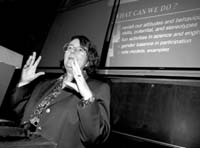Women engineers still face rough ride
by Sylvain Comeau
 |
Dr. Monique Frize wants to see more women in engineering
[ PHOTO: OWEN EGAN ] |
Women who choose engineering as their profession still face disheartening obstacles and old-fashioned stereotypes in this traditionally male-dominated world, according to Dr. Monique Frize.
Frize, a professor of electrical engineering at the University of New Brunswick, holds the Nortel-NSERC Women in Engineering Chair, created at UNB in 1989. The distinction came with a considerable responsibility--"to increase the participation of women in engineering school, in the workplace, and in professional associations"--explained Frize at a March 27 lecture at McGill.
"I give speeches across the country; I talk to students, people in the workplace, teachers." She also organizes a science and engineering summer camp for girls and boys, and helps educators organize outreach strategies such as mentor programs and "job shadowing," in which a student follows an engineer on the job for a day.
Frize said that when she accepted the chair, "I didn't realize that I would have two full-time jobs for one salary. But I'm having so much fun doing groundbreaking work that I forget about the workload."
Her first year was marked by the murders of 14 female engineering students at Université de Montréal's École Polytechnique.
"This was a horrendous way to start a job intended to attract more women into engineering if it meant you can get killed for choosing this field. That day turned my job into a mission. I said to myself, '(I will help recruit) a thousand women for every one that died.' That's why I've been working so intensively across the country, with men and women in partnership, to deal with the problems faced by women engineers."
One of those problems is the changing job market in engineering. "More and more small firms will be hiring graduates, but small firms don't have equity (hiring) policies. In one of my studies, I looked at 600 UNB engineering graduates. I discovered that almost all the women had been hired in firms which had equity policies, and almost none in firms which didn't."
She also found that equity policies were fair to both sexes. "I was pleased that the firms with equity policies hired almost the same proportion of male graduates as in my survey population. This proved to me that there was no reverse discrimination in firms with equity policies, although there could be tremendous discrimination (against women) in firms without these policies. I hope that puts to rest some of the myths."
But Frize knows that such myths die hard. "Young women often tell me that some of their colleagues say, 'You got the job because you're a woman.' But that's not the case. What happened was that all the men and women who met the criteria got the job."
Equity policies emerged partially because more women are graduating from university than before. On that front, engineering has seen a positive and recent change.
"Ten years ago, less than 10% of students in engineering schools in Canada were women. Now, the proportion is closer to 20%. That's higher than the U.S., England or Australia. So we're doing very well, although there is still work to be done."
Frize encourages engineering schools to hire more women faculty members and to launch active recruitment drives for female students. She warns against a tendency to view the 20% enrolment average as a ceiling.
"Queen's is at 28%, Guelph is at 43%, and some European schools are at 40%. So there is no reason to be satisfied with 20%, and say, 'Okay, we've done it, now we can move on to other things.'"
Reaching such historically high proportions can be an uphill battle, because gender stereotyping is still alive and well, says Frize.
"There are still lots of things in our society which create what I call 'blockers.' Girls and young women drop out (of an engineering educational or career track) because of all the signals they read around them. Even five-year-olds will start to limit themselves because of what they hear. Many boys will never let themselves think about nursing, or other fields of interest to them, and girls won't consider fields like engineering."
Frize has heard variations on the same discouraging theme in dozens of anecdotes.
"One woman told me that her five-year-old daughter was asked if she was going to be an engineer. She replied, 'Only boys can be engineers.' And this little girl even has a role model at home--her mother is an engineer! I hear so many stories like that."
In addition to peer group and school pressure, too many girls are being told by their parents that science is simply not feminine. Frize was "shocked" when she conducted an informal study of birth announcements, which revealed heavy gender stereotyping. One couple hailed the arrival of a daughter, describing her as "our little secretary," while another pair predicted that their daughter was going to become a ballerina. Many parents of boys saw their sons as potential baseball stars.
Frize would like to see programs aimed at educating parents at the earliest possible stage. "If parents already have stereotypical ideas about their children's careers, we need to start educating mom and dad at pre-natal classes--that's where it starts."
Frize's lecture was presented by the Faculty of Science, the McGill Centre for Research and Teaching on Women, and Women in Science and Engineering (WISE).